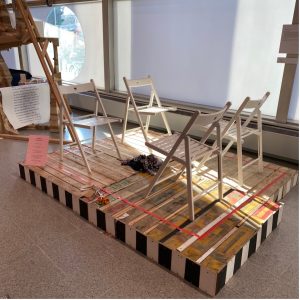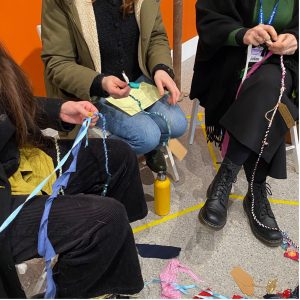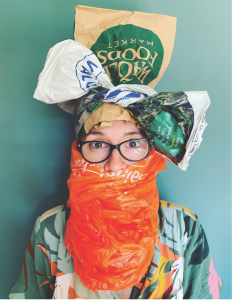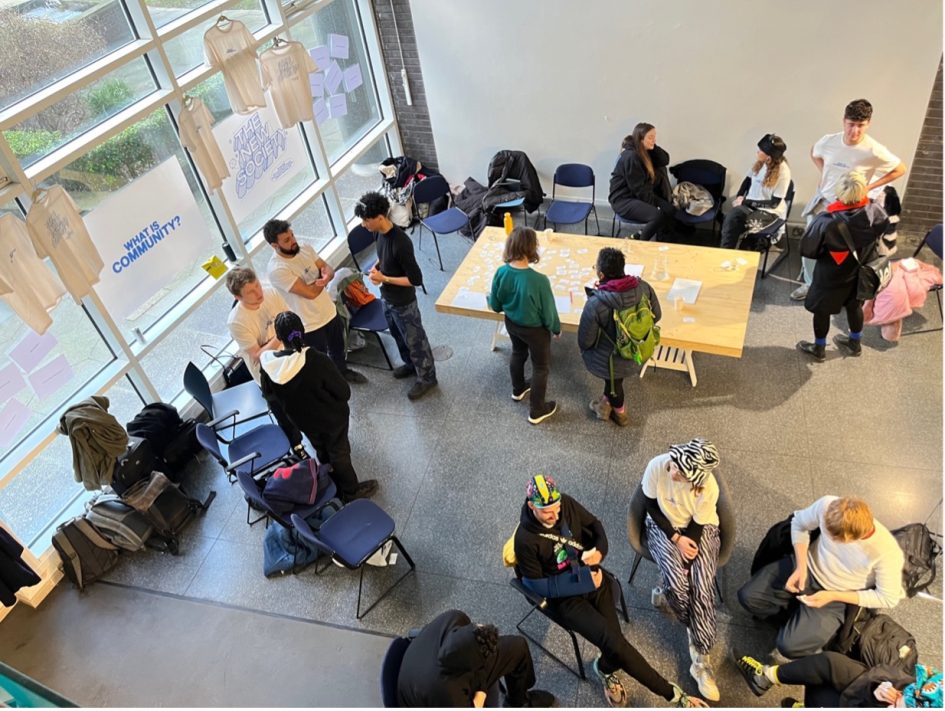‘Structures of Community’ Symposium, Brighton CCA, supported by CSECP, 18th January 2023
Set in the context of Summer House by RESOLVE Collective, an exhibition at Brighton CCA, this second edition in the series of Structures of Community responded to the work of the young collective of Black/PoC artists, architects, designers and engineers. The symposium kicked off with a framing contribution by Akil Scafe-Smith of RESOLVE, who spoke about the historical connections between Brighton and Croydon and how they were bringing these into the present through pairing Black creatives from both locations over three ‘seasons’ in their public programme activating the exhibition. Akil’s talk highlighted the theme of spatial inequalities and how design (and art) can work to highlight them in both tangible and intangible ways.

The exhibition Summer House by RESOLVE Collective installed at Brighton CCA, November 2022 – February 2023. Photo: Rob Harris
Prior to hearing from Akil, writer and curator Pacheanne Anderson had introduced us to the exhibition space, featuring their collaborative curatorial project titled ‘Reclaiming Space’ which formed the final season of RESOLVE Collective’s Summer House. The thought-provoking work on show and the exhibition title together with the themes of the day and the gallery space itself became key points of reflection throughout the day.

Akil Scafe-Smith of RESOLVE Collective introducing their project giving a frame to the event.
We then held four roundtable groups with different focuses, there were themed as ’Ethics, care and trauma’; ‘Social Practice as Practice-Based research’; ‘Methodologies’ and ‘Spaces’. Each group considered questions which came out the previous symposium in May 2022. The format was a direct response to feedback following the initial event and prioritised facilitated dialogue and knowledge exchange.
The group on ethics and care considered the work before the work – who commissions it and why, and what the aims were. They suggested that sometimes taking risks can be important. They acknowledged the way artists often hold spaces and make spaces of care, but that there also needs to be an ethics of care to artists.
The ‘Methodologies’ group considered how methodologies can be a personal reflection of the self, and then how you align these methods with others. Therefore, they asked how can we stay connected (while acknowledging difference) and also share research that comes out of different places? They also discussed what tools there are to apply methodologies in practice.

Documentation of ‘Social Constellation Drawings’ from Social Circles workshop Recuperative spaces with RESOLVE Collective’s Summer House installation in the gallery in Brighton CCA.Photo: Helen Dewhurst.
Documentation of ‘Social Constellation Drawings’ from Social Circles workshop Recuperative spaces with RESOLVE Collective’s Summer House installation in the gallery in Brighton CCA. Photo: Helen Dewhurst.
The ‘Spaces’ group focused on race and the legacy of colonialism, thinking about the University as part of a colonial legacy of institutions. They asked how change can be genuine when all too often it is tokenistic and temporary and thought about how it feels to occupy the space of the University, or to create new spaces that reflect what you want. They also discussed the economics of spatial inequalities, and who is in control, has the power and funding to make decisions over space.
The ‘Social Practice as Practice-Based research’ based research group discussed what ‘knowledge’ looks like in the context of social practice and research, and how research contexts can sometimes seem like narrow spaces which this work doesn’t easily fit into. We also discussed the different kinds of spaces that are inclusive/exclusive of this work including academic and galleries. An interesting point was raised about how worked made in one site (often outside the institution) is then presented in another site (often in the institution) and how this can be done more or less successfully.

Documentation from Social Circles workshop Recuperative spaces, asking “What will hold you up and sustain you?” with RESOLVE Collective’s Summer House installation in the gallery in Brighton CCA. Photo: Helen Dewhurst.

Documentation from Social Circles workshop Recuperative spaces with RESOLVE Collective’s Summer House installation in the gallery in Brighton CCA.
In the afternoon, three fantastic workshops explored themes and questions around the idea of recuperation. This was led by RESOLVE Collective offering the notion of generative rest within their exhibition research. Artist duo Leap Then Look’s workshop invited participants to build structures to project onto, which took over and disrupted the space of the lecture theatre. They invited participants to think about questions of permission and finding ways to make and play together with words, prompts and shapes acting on impulse and the politics of play. Brighton Social Practice Artists Peer Group held a textile activity in the gallery structured as a series of chair constellations encouraging participants who didn’t know each other to share thoughts on what their support structures were, and how they did or didn’t feel supported. They also had a small sculpture activity along the same theme. Bobby Brown and The New Society led a discursive workshop including using an AI chatbot that presented ‘well-informed’ descriptions of social practice and structural inequalities as well as prompts, one-on-one exchanges and group discussions positioned in circles. This workshop asked “What is Community”, with Bobby creating several recordings as a trace from the day. Bobby Brown and The New Society have a background in youth-work and music which offered a different angle to bringing ideas to the themes of structural inequalities that worked well intersecting with arts, design, architecture, and academia.

Artist duo Leap then Look’s Recuperative spaces workshop in the Sallis Benney Theatre
The final conversation brought everyone together to reflect on the activities. We spoke about the power of collaborative exchange, which felt inclusive. However, the space of each activity also brought up questions around belonging, where people felt a natural affinity and where it felt harder to enter spaces, due to the non-physical barriers or feelings of resistance. Surrounded by sculptural forms in the lecture theatre, we spoke about transgressing expected ways of behaving in spaces, and not always asking permission.
The symposium was followed by a drinks reception and talk by Ally Waller and Sophie Beard about their lockdown mask project Collectarium, which they have now published as a book.

Still from Collectarium by Ally Waller and Sophie Beard.
We had over 60 participants and brought together artists, researchers, architects, curators, University of Brighton students and staff, and the local community. We felt energised from the more experimental format of the symposium and are excited to design future ways that expand, draw on and look to publish this series of research events.



Leave a Reply